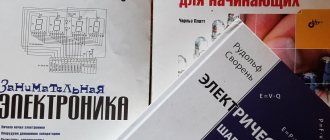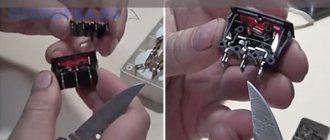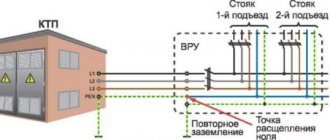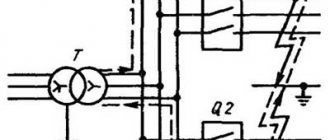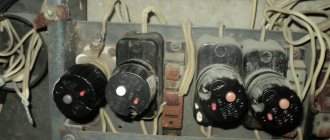What can an electrician do?
Electrician
performs assembly and disassembly, adjustment and repair, maintenance of electric motors, generators, teleautomatic circuits and other electrical appliances. ... Conducts internal electrical networks in residential and industrial premises and performs their repairs.
Interesting materials:
What percentage of ultraviolet light does glass transmit? How long does Prusak live without water? How many springs are in the Multipack? How long is the Bluetooth range? How many times should I milk after calving? How many times should you feed laying hens? How many times can a goat give birth? How many times can you feed strawberries with yeast? How many times can you use an oak broom? How many times can you sow phacelia?
Who assigns categories for the profession of electrician?
Collegiality ensures a comprehensive and objective review of documents reflecting the employee’s work activity, an unbiased assessment of the level of his qualifications, opportunities for professional growth, etc.
To obtain it, you must be certified, and the assignment is handled by a special commission, which issues the certificate to the employee in a single copy.
We recommend reading: Mort for children
During certification, the degree of compliance of the employee with the position held (the work performed) and the degree of advanced training are determined, prospects for using the employee’s potential capabilities are identified, etc. Based on the current legislation regulating the certification procedure, it is possible to carry out a conditional classification and distinguish several types of certification: - periodic (carried out every three to five years); - one-time, which is carried out at the initiative of the employer to resolve the issue of dismissing an employee (Art.
Must know” and pass the qualifying trial work, i.e. Profession electrician. who is an electrician, description of the profession Important In
About the profession of Electrical Engineer, which can be obtained in Ulyanovsk
Bachelor's and specialty2
Universities1
An electrical engineer is involved in the creation of electronic devices and instruments. With the help of electronic devices in various fields of science and technology, complex processes of generation, amplification, conversion, measurement and formation of electrical signals, logical operations and many other processes are carried out. The versatility, speed, accuracy and sensitivity of electronic technology opens up new development opportunities in many branches of science and technology.
Electronic engineer
An electrical engineer is involved in the creation of electronic devices and instruments. With the help of electronic devices in various fields of science and technology, complex processes of generation, amplification, conversion, measurement and formation of electrical signals, logical operations and many other processes are carried out. The versatility, speed, accuracy and sensitivity of electronic technology opens up new development opportunities in many branches of science and technology.
An electronics engineer develops electrical devices. Creating a new device is a complex, multi-stage process. First of all, the engineer receives a technical specification - a document containing the requirements for the device being created. Based on knowledge of mathematics, physics, and chemistry, the engineer mentally embodies the points of this task into a working electronic device. The developer embodies the results of his mental work in an electrical circuit, coordinates it with the manager and checks it on a mock-up - this is a pre-fabricated device from parts, the location of which is not yet final.
After agreeing on the now slightly modified draft diagram and the data obtained from testing the layout, the diagram is drawn in strict accordance with the standards. The engineer must ensure that it is as clear as possible. Then comes the stage of designing the device according to this scheme, the design estimate is made by the electronics engineer himself, and the designer finalizes it.
Type of professional environment according to Holland:
- If an electrical engineer is engaged in research, development in the field of electrical engineering, design of electrical systems, such work belongs to the intellectual type of professional environment
- If an electrical engineer is involved in the repair, operation and maintenance of electrical systems, then such work would be a realistic type of occupational environment.
Expand
Electrical technical personnel are divided into subcategories:
- Operations and repair - specialists trained in servicing the equipment assigned to them.
They, like all other categories, require an electrical safety permit. - Operational - these workers carry out operational shifts, inspections, supervision, prepare the workplace, and are responsible for access to work.
- Repair - employees who service and repair equipment, carry out repairs and commissioning work.
- Administrative and technical - people who organize technical processes, their maintenance, and are responsible for installation, repair, and adjustment of electrical installations.
- Electrical technological personnel of production departments are people who participate in technological processes based on electricity, for example, electrolysis, electric welding, and the operation of electric ovens.
What does an electrical engineer do?
An electrical engineer is a specialist responsible for the operation of power supply systems. He is engaged in the development and design of power supply systems for facilities and enterprises, manages the processes of distribution and supply of energy, and also ensures the uninterrupted operation of electrical installations.
One of the main tasks of an electrical engineer is to regularly inspect equipment and ensure the safety of the electrical power supply process. If necessary, such specialists repair electrical equipment and carry out diagnostic work on network maintenance.
The position is in demand in industry, the energy sector, and development companies. You can obtain the profession of an electrical engineer through professional retraining courses based on higher or secondary vocational education.
Job requirements
To work in this profession, a person must understand the basics of electrical engineering and automation, know safety standards and operating rules for electrical installations, be able to read electronic circuits, and also have experience working with electrical equipment.
Experts in the field of electrical energy are able to create energy supply projects for free-standing buildings and cities from scratch. Power system design requires drafting skills and experience in AutoCAD.
Salary
The profession of electrical engineer is in demand and involves the possibility of receiving not only the main, but also additional income.
Specialists who have completed training in their specialty are engaged in private practice, working at power plants, thermal power plants, as well as in construction and management companies.
Power equipment repair technicians are able to combine work in several organizations at once, as well as provide private services for the repair and maintenance of electrical networks.
The minimum salary for a beginning specialist in Russia is 30,000 - 35,000 rubles per month. An experienced electrical engineer can earn about 50,000 - 80,000 rubles monthly.
Where to study to become an electrical engineer?
At the International Academy of Expertise and Assessment, you can obtain the profession of an electrical engineer in 3 months on the basis of higher or secondary vocational education:
- One of the most affordable prices in Russia
- Fully distance learning from the comfort of your home
- Diploma of professional retraining of the established form
- Certificate of compliance with professional standards worth 10,000 rubles. For a present!
- Valid license for educational activities
- More than 10,000 graduates from 85 constituent entities of the Russian Federation.
You can find out more details and apply for training here: https://electrical engineer.maeo.rf
About the profession of Electrical Engineer, which can be obtained in Tver
Bachelor's and specialty1
Universities1
An electrical engineer is involved in the creation of electronic devices and instruments. With the help of electronic devices in various fields of science and technology, complex processes of generation, amplification, conversion, measurement and formation of electrical signals, logical operations and many other processes are carried out. The versatility, speed, accuracy and sensitivity of electronic technology opens up new development opportunities in many branches of science and technology.
Electronic engineer
An electrical engineer is involved in the creation of electronic devices and instruments. With the help of electronic devices in various fields of science and technology, complex processes of generation, amplification, conversion, measurement and formation of electrical signals, logical operations and many other processes are carried out. The versatility, speed, accuracy and sensitivity of electronic technology opens up new development opportunities in many branches of science and technology.
An electronics engineer develops electrical devices. Creating a new device is a complex, multi-stage process. First of all, the engineer receives a technical specification - a document containing the requirements for the device being created. Based on knowledge of mathematics, physics, and chemistry, the engineer mentally embodies the points of this task into a working electronic device. The developer embodies the results of his mental work in an electrical circuit, coordinates it with the manager and checks it on a mock-up - this is a pre-fabricated device from parts, the location of which is not yet final.
After agreeing on the now slightly modified draft diagram and the data obtained from testing the layout, the diagram is drawn in strict accordance with the standards. The engineer must ensure that it is as clear as possible. Then comes the stage of designing the device according to this scheme, the design estimate is made by the electronics engineer himself, and the designer finalizes it.
Type of professional environment according to Holland:
- If an electrical engineer is engaged in research, development in the field of electrical engineering, design of electrical systems, such work belongs to the intellectual type of professional environment
- If an electrical engineer is involved in the repair, operation and maintenance of electrical systems, then such work would be a realistic type of occupational environment.
Expand
Qualification characteristics of electricians of industrial enterprises
Methods of laying wires in gas pipes, on rollers and cable suspensions. · Rules for switching on electrical machines. · Mechanical and instrumentation tools, fixtures and equipment used during assembly and installation. An electrical fitter of 3-4 categories must be able to: · Assemble simple components and devices using universal devices and tools. · Mount and install electrical machines with a power of up to 50 kW and welding machines with a power of up to 30 kW and test them after installation. · Assemble and install units and devices of medium complexity using special devices and templates. · Manufacture parts, assemble, install and test simple electrical structures of low-voltage equipment, as well as electrical instruments and ballasts. · Mount and solder conductor lugs.
Brief historical background
As you might guess, the history of the electrical installation profession begins from the moment when electricity became an integral part of our lives. But the very first government bodies that began to control the activities of electricians appeared only in the 1940s. It was this historical period that was marked by rapid industrialization, when electricity finally won “its place in the sun.”
It is worth noting that technological progress today is actively contributing to an increase in demand for technical personnel. Therefore, it is not at all surprising that electricians are included in the list of the most paid professions today, the knowledge and experience of which is in great demand. After all, only an electrician can install complex, high-tech electrical equipment in production and beyond. These professionals can install home wiring, overhead cables, and overhead cables.
In general, the range of work that a modern electrician can perform is expanding every year, as new and very interesting directions in this field of activity emerge. An electrician has a huge responsibility. If such a specialist makes the slightest mistake in his work, this can lead to catastrophic consequences. That is why only attentive people who know how to focus on the work process are accepted into this specialty.

